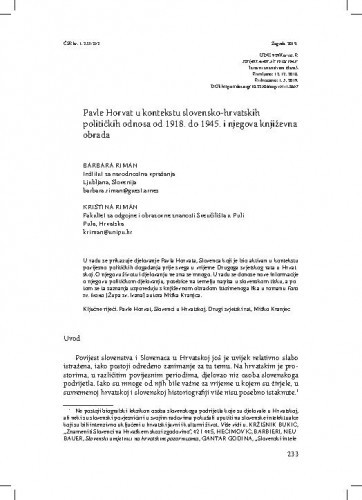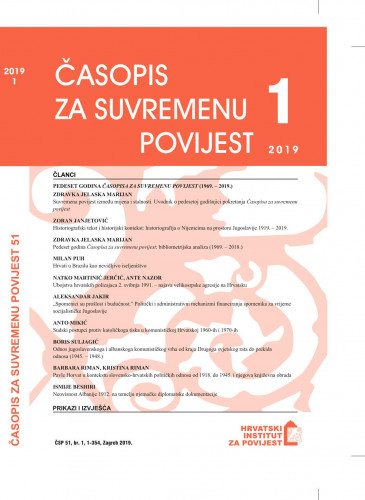U radu se prikazuje djelovanje Pavla Horvata, Slovenca koji je bio aktivan u kontekstu povijesno-političkih događanja prije svega u vrijeme Drugoga svjetskog rata u Hrvatskoj. O njegovu životu i djelovanju ne zna se mnogo. U radu se donose nove informacije o njegovu političkom djelovanju, posebice na temelju napisa u slovenskom tisku, a potom se ta saznanja uspoređuju s književnom obradom istoimenoga lika u romanu Fara sv. Ivana (Župa sv. Ivana) autora Miška Kranjca.; Examining the data on Pavle Horvat published on the basis of scientific and professional papers as well as newspaper articles shows two basic views of his work. The first involves the beginnings of his public and political activity, and concerns a young man who wished to actively participate in the then current political events in Slovenia but, for various reasons, most of all probably his approach, failed. The second view is much more intense and focuses on moments from Horvat’s life that do not show him in a positive light, but as a “bad guy” who created a false public image of himself. Based on the gathered data, it is difficult to complete both images and it is certainly necessary to conduct more research in order to answer all questions. The data gleaned from the daily press is partial, as is the data from the documents. The second image, which can be seen from the gathered data, serves as the basis for forming the literary character of Pavle Horvat in the novel Fara sv. Ivana (The Parish of St John) by Miško Kranjec. In it, Horvat’s character is showed in a negative light, as a person who primarily fights for his personal interests under the guise of caring for Slovenians in Croatia. Such a literary formation may be based on documents and newspaper articles that were available to author Miško Kranjec, but could also be based on Kranjec’s subjective opinion, since it is obvious he knew Horvat personally and therefore immortalised him in his novel. Even though the character of Pavle Horvat is today almost unknown in Slovenian and Croatian historiography, it is precisely the literary formation of his character that prompts us to think about the less-known Slovenian-Croatian political relations in the interwar period and especially during World War II.
Sažetak

 Časopis za suvremenu povijest : 51,1(2019) / glavni i odgovorni urednik, editor-in-chief Zdravka Jelaska Marijan.
Časopis za suvremenu povijest : 51,1(2019) / glavni i odgovorni urednik, editor-in-chief Zdravka Jelaska Marijan.